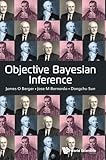Objective Bayesian Inference / by James O Berger , Jose-Miguel Bernardo and Dongchu Sun
Material type: TextLanguage: English Publication details: New Jersey : world scientific, 2024.Description: xv, 364 p. : ill. ; 25 cmISBN:
TextLanguage: English Publication details: New Jersey : world scientific, 2024.Description: xv, 364 p. : ill. ; 25 cmISBN: - 9789811284908
- B2871 R4
| Item type | Current library | Home library | Call number | Status | Barcode | |
|---|---|---|---|---|---|---|
 Textual
Textual
|
Central Science Library | Central Science Library | B2871 R4 (Browse shelf(Opens below)) | Available | SL1655932 |
Includes biography, author index and Index
Bayesian analysis is today understood to be an extremely powerful method of statistical analysis, as well an approach to statistics that is particularly transparent and intuitive. It is thus being extensively and increasingly utilized in virtually every area of science and society that involves analysis of data.A widespread misconception is that Bayesian analysis is a more subjective theory of statistical inference than what is now called classical statistics. This is true neither historically nor in practice. Indeed, objective Bayesian analysis dominated the statistical landscape from roughly 1780 to 1930, long before 'classical' statistics or subjective Bayesian analysis were developed. It has been a subject of intense interest to a multitude of statisticians, mathematicians, philosophers, and scientists. The book, while primarily focusing on the latest and most prominent objective Bayesian methodology, does present much of this fascinating history.The book is written for four different audiences. First, it provides an introduction to objective Bayesian inference for non-statisticians; no previous exposure to Bayesian analysis is needed. Second, the book provides an overview of the development and current state of objective Bayesian analysis and its relationship to other statistical approaches, for those with interest in the philosophy of learning from data. Third, the book presents a careful development of the particular objective Bayesian approach that we recommend, the reference prior approach. Finally, the book presents as much practical objective Bayesian methodology as possible for statisticians and scientists primarily interested in practical applications.
There are no comments on this title.

